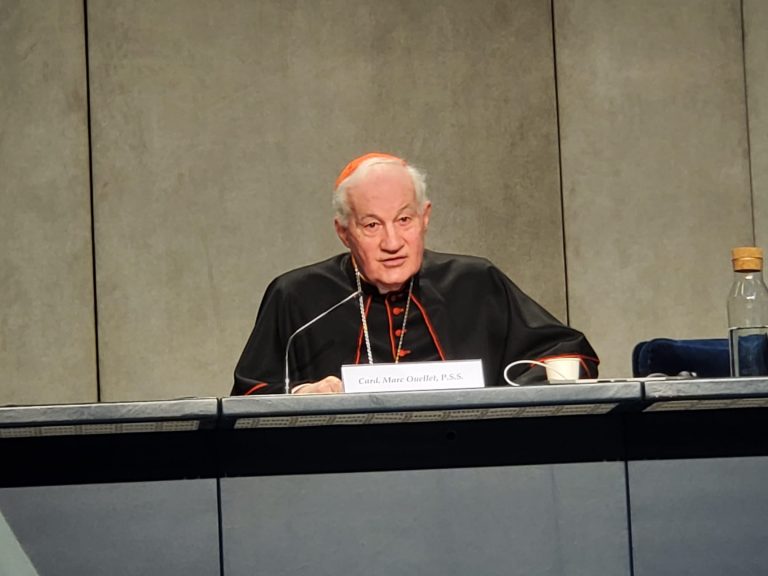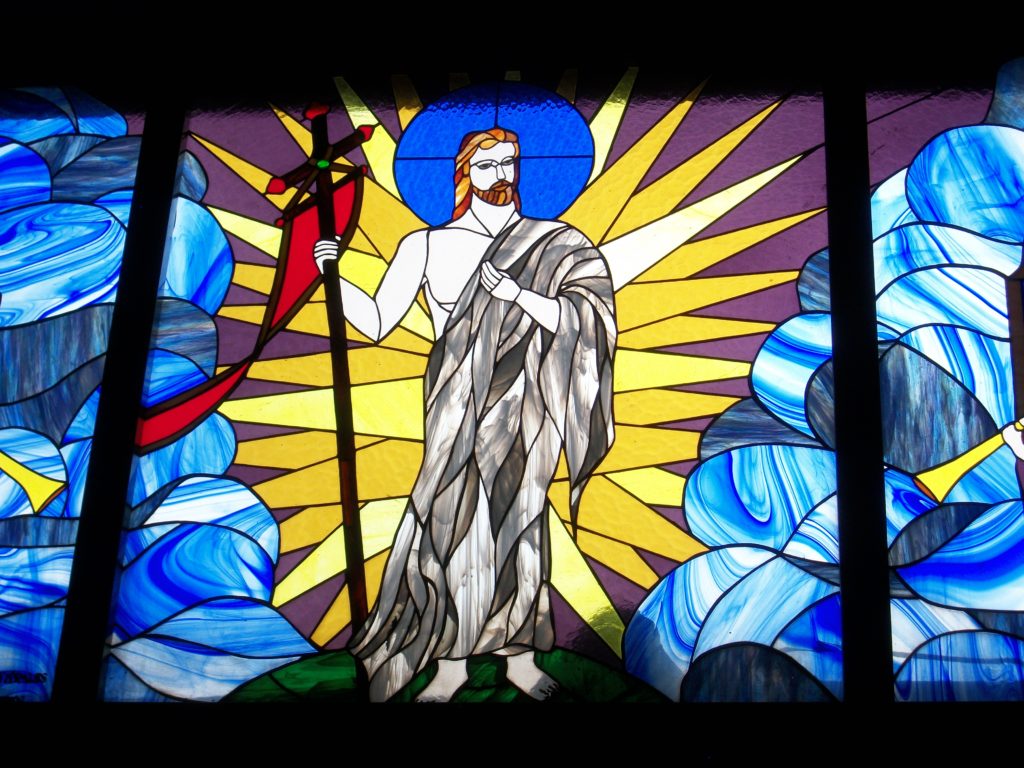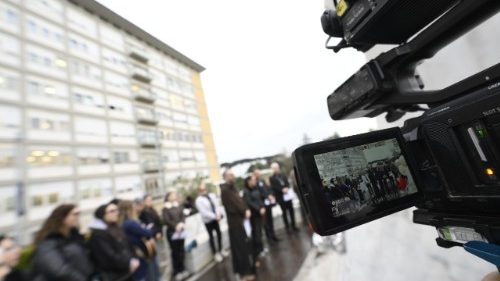FEATURE: Cardinal Ouellet to Exaudi: For Priests, a Spirituality of Fatherhood Is Fundamental
Reflects on What Is Necessary Amid Current Challenges

Cardinal Marc Ouellet says having a real, broader, deeper ecclesiology and recognizing a certain ‘spirituality of fatherhood’ is key for priests today to properly serve amid contemporary challenges.
Speaking to Exaudi during the Vatican’s Press Conference to present the International Theological Symposium titled “For a Fundamental Theology of the Priesthood,” organized by the Congregation for Bishops, Feb. 17-19, 2022, the Prefect of the Vatican’s Congregation for Bishops said this.
Speaking along with the Canadian-born cardinal was Professor of Theology at the Pontifical Gregorian University, Michelina Tenace, and Rector of the Pontifical French Seminary in Rome, Prof. Vincent Siret, remotely. The presentation took place in the Holy See Press Office with some accredited journalists, but was also streamed for all following virtually.
Exaudi had asked the cardinal how faced with scarcity of vocations in many parts of the world, how does he foresee the role of priests changing, and how faced with risks of clericalism, what he believes is needed to prevent this problem.
“That is a big question which has a great pastoral impact and importance,” he began.
Need for Real, Enriched Ecclesiology – Seeing Big Picture
“I would say that just going forward in the line that was developed by Professor Tenace that the priests need a real ecclesiology which is enriched with an overall vision of what I call the ‘trinitarian ecclesiology,’ which makes visible the sacramentality of the Church, linked to the Divine Persons,” the Vatican prefect reflected.
“If the priests have a broader ecclesiology, and a deeper ecclesiology,” Cardinal Ouellet highlighted, “they will understand themselves as part of a communion and at the service of this communion, which is much bigger than themselves and their power or their ministry.”
“And so,” he said, “they will live more in function of serving the growth that the father wants to see in his sons and daughters in the Church.”
Spirituality of Fatherhood Is Fundamental
“This spirituality of fatherhood,” the cardinal underscored, “is fundamental to understand the relationship to the baptized, as a service.”
“And so,” he continued, “I think the symposium wants to offer a pause of reflection, a pause of deep reflection, so that afterwards, they [priests] will exercise their ministry with a different mentality.”
“If they conquer, in the sense of appreciating, what is offered and reflected upon, it will have consequences in their way of exercising ministry,” he said.
Cardinal Ouellet noted the event will consist of an intense three-day session, open to all, but intended especially for bishops, and for all those, men and women, who are interested in theology, in order to deepen our understanding of vocations and the importance of communion between the different vocations in the Church.
“A theological symposium does not claim to offer practical solutions to all the pastoral and missionary problems of the Church,” the cardinal admitted, “but it can help us deepen the foundation of the Church’s mission.”
He added that insight from Divine Revelation on the priesthood of Christ and the participation of the Church in this priesthood “is a crucial question for our time. This is not a new theme, but a central one, the originality of which will be to establish a fundamental relationship between the priesthood of the baptized, which the Second Vatican Council has enhanced, and the priesthood of ministers, bishops and priests, which the Catholic Church has always affirmed and specified.”
“We are also all aware of the scarcity of vocations in many regions, as well as tensions on the ground due to divergent pastoral visions, challenges posed by multiculturalism and migrations, not to mention the ideologies that condition the witness of the baptized and the exercise of the priestly ministry in secularized societies.
In this context, Cardinal Ouellet pondered, we ought to ask ourselves: “how can we live a missionary conversion of all the baptized without a new awareness of the gift of the Holy Spirit to the Church and to the world through the Risen Christ?”
Renewed Vision, But Valuing All Vocations Respecting What’s Specific to Each
In this search for synodal conversion, he suggested, “there is room for a vast theological endeavor which should offer a renewed vision, a sense of the essential, a way of valuing all vocations while respecting what is specific to each.””
“Such a vision of the communion of vocations is rooted in the communion of divine Persons and seeks to deploy a Trinitarian ecclesiology capable of energizing the synodal and missionary Church that Pope Francis dreams of.”
This research, Cardinal Ouellet emphasized, interests the whole Church, especially bishops, but also theologians, consecrated life, married people, and those involved in formation at all levels.
Pope Francis will receive the participants of the Symposium in audience, while Vatican Secretary of State, Cardinal Pietro Parolin, will preside over a Mass for them.
The Vatican will publish the conference details and program soon.
Here is the Vatican-provided text of Cardinal Ouellet’s intervention:
***
As Vocations Sunday approaches, and within the framework of the Church’s research on synodality, I have the honor and the joy of presenting to the public the project of a Theological Symposium on Vocations. Pope Francis has often repeated what he said in 2015 about synodality: “The path of synodality is the path that God expects from the Church of the third millennium.” This expectation of God and of the Holy Father may seem abstract at first glance, but when we consider it from the point of view of vocations, it takes on a very concrete content. Synodality basically means the active participation of all the faithful in the mission of the Church, it describes the united march of the baptized towards the Kingdom which is being built on a daily basis in the realities of family, in the workplace, as well as in social and ecclesial life in all its forms. This requires a life of faith and close collaboration between lay people, priests and men and women religious, for the proclamation of the Gospel to the world through the attractive witness of Christian communities. This expected growth of a Synodal Church certainly corresponds to the orientations of the Second Vatican Ecumenical Council, which are still being implemented with a more profound theological and pastoral comprehension.
The Symposium that we are bringing to the attention of the public today is entitled: “Toward a Fundamental Theology of the Priesthood”. It consists of an intense three-day session, open to all, but intended especially for bishops, and for all those, men and women, who are interested in theology, in order to deepen our understanding of vocations and the importance of communion between the different vocations in the Church. Saint Teresa of the Child Jesus, patron saint of the missions and doctor of the Church, reminded us that love is the driving force behind the mission of the Church. She bore witness to this love above all through prayer and penance as part of her life in the Carmel. But this love is poured out by the Holy Spirit in the hearts of all the baptized, to be given to the world through what Saint Paul calls the “ligaments and bonds” of the Body of Christ (Col 2, 19), that is to say, by the Church present and operating in the world at the service of suffering humanity today. This priesthood of Love, which is exercised by the entire ecclesial community, is animated and supported by a variety of vocations to love, whose distinct forms and colours complement each other. Between priests and lay people, between men and women religious of different charisms, the Holy Spirit communicates the grace which brings about communion among all, enabling obstacles to be overcome, and through this communion, mysteriously and at least virtually, reaching the whole of humanity. It is clear that such theological and pastoral research does not concern only Europe or America but the whole Church on all continents.
A theological symposium does not claim to offer practical solutions to all the pastoral and missionary problems of the Church, but it can help us deepen the foundation of the Church’s mission. Insight from Divine Revelation on the priesthood of Christ and the participation of the Church in this priesthood is a crucial question for our time. This is not a new theme, but a central one, the originality of which will be to establish a fundamental relationship between the priesthood of the baptized, which the Second Vatican Council has enhanced, and the priesthood of ministers, bishops and priests, which the Catholic Church has always affirmed and specified. This rapport is not to be taken for granted in our time, because it entails pastoral readjustments, and it involves ecumenical questions not to be ignored, as well as the cultural movements that question the place of women in the Church. We are also all aware of the scarcity of vocations in many regions, as well as tensions on the ground due to divergent pastoral visions, challenges posed by multiculturalism and migrations, not to mention the ideologies that condition the witness of the baptized and the exercise of the priestly ministry in secularized societies. In this context, how can we live a missionary conversion of all the baptized without a new awareness of the gift of the Holy Spirit to the Church and to the world through the Risen Christ?
In this search for synodal conversion, there is room for a vast theological endeavour which should offer a renewed vision, a sense of the essential, a way of valuing all vocations while respecting what is specific to each. Such a vision of the communion of vocations is rooted in the communion of divine Persons and seeks to deploy a Trinitarian ecclesiology capable of energizing the synodal and missionary Church that Pope Francis dreams of. It is clear that this research interests the whole Church, especially bishops, but also theologians, consecrated life, married people, and those involved in formation at all levels. My colleagues will offer more on this in a moment.
I might add on my part that this initiative is a big undertaking which has been carefully prepared, but which carries a margin of risk in the current circumstances of the pandemic. It is, therefore, an act of faith that we would not have entered upon without some confirmation from above, plus the urgency of creating a vocational movement following the various synodal experiences of recent years. Indeed, during the synods on the family, on young people, and on the Church in Amazonia, questions regarding the priesthood and synodality were raised in all their magnitude, with an insistence on the reality of baptism, the basis of all vocations. The time has come to prolong the reflection and to promote a vocational movement facilitating the sharing of the various Church experiences all over the planet.
We therefore want to bring together national and diocesan delegations from all continents to the Paul VI audience hall for three days, from February 17 to 19, 2022, with an intense program of conferences, crowned by a message from Pope Francis. The conference program is available to journalists and to the public from today. A website, opened a few days ago, will provide further information to interested parties, facilitating registration for participants as well as to solicit financial contributions in support of the organization of this great event.
Given the scope of this symposium, we hope it will mark a stage in the research of the Church and encourage new initiatives and publications. I cannot extend this invitation as Prefect of the Congregation for Bishops without appealing for prayers from the people of God, and in particular, from contemplative communities. Since this is the question of the priesthood, whose baptismal and ministerial awareness we must reenergize, as well as the consciousness of the fruitfulness of consecrated life, this can only be obtained by a grace from above to be implored with insistence and perseverance. I therefore invite especially bishops to welcome this call and to re-launch this concern for vocations within the framework of their particular Church, in communion with Pope Francis and his collaborators of the Roman Curia. I thank the Communications Department of the Holy See for being available to collaborate today and in the months to come for this event. Thank you very much.
[Original text: English]
[Vatican-provided English text]
Related

Easter: Mystery of Freedom
Carlos J. Gallardo
20 April, 2025
5 min

Pope Francis spent a peaceful night
Exaudi Staff
02 March, 2025
1 min

Pope Francis has had a peaceful night
Exaudi Staff
25 February, 2025
1 min

What should the boyfriend or girlfriend I should find be like?
Patricia Jiménez Ramírez
24 February, 2025
4 min
 (EN)
(EN)
 (ES)
(ES)
 (IT)
(IT)

